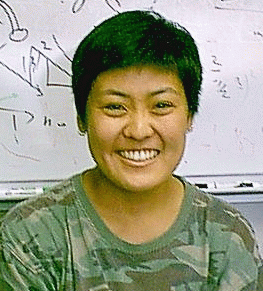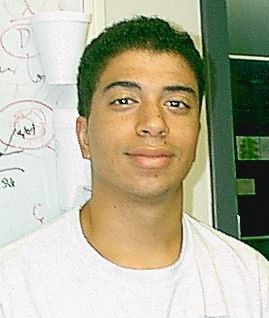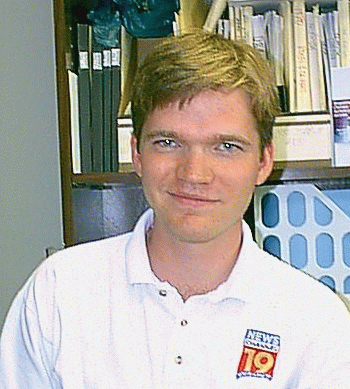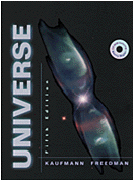| WEEK | DATE | CHAP | TOPIC | QUIZ | HOMEWORK | SOLUTIONS |
| 1 | Aug 23 | 1 | The Universe | | [1]:2,3,6,10,12,16,20,21,23,24 | |
| 1 | Aug 25 | 2 | The Heavens | Quiz 01 | |
| 2 | Aug 28 | 2 | The Heavens | | [2]:5,6,8,9,10,13,21,24,28,30 | |
| 2 | Aug 30 | 2 | The Heavens | Quiz 02 | | Chap 1 |
| 2 | Sep 01 | 3 | Eclipses | Quiz 03 | [3]:1,2,3,9,11,14,15,20,22,27 | |
| 3 | Sep 04 | | * *Holiday * | | | |
| 3 | Sep 06 | 3 | Eclipses | Quiz 04 | | Chap 2 |
| 3 | Sep 08 | 4 | Gravitation | Quiz 05 | [4]:
3,4,6,10,12,14,16,17,22,27 | |
| 4 | Sep 11 | 4 | Gravitation | | | Chap 3 |
| 4 | Sep 13 | 4 | Gravitation | Quiz 06 | | |
| 4 | Sep 15 | 5 | Light&Matter | No Quiz | [5]:
4,5,7,10,11,14,18,21,25,28 | Chap 4
|
| 5 | Sep 18 | 5 | Light&Matter | | | |
| 5 | Sep 20 | 6 | Telescopes | Quiz 08 | | Chap 5 |
| 5 | Sep 22 | | ***TEST 1*** | | | |
| 6 | Sep 25 | 6 | Telescopes | | [6]: 3,4,6,7,12,13,15,18,19,21 | |
| 6 | Sep 27 | 6 | Telescopes | Quiz 09 | | | |
| 6 | Sep 29 | 7 | Solar System | No Quiz | | |
| 7 | Oct 02 | 7 | Solar System | | [7]:1,2,7,9,12,13,14,16,18,19 | Chap 6 |
| 7 | Oct 04 | 8 | Living Earth | No Quiz | [8]:3,5,6,7,10,11,12,13,18,19 |
| 7 | Oct 06 | | * *Holiday * | | | |
| 8 | Oct 09 | 8 | Living Earth | | | Chap 7 |
| 8 | Oct 11 | 17 | Vagabonds | Quiz 12 |
[17]:5,8,9,11,12,15,19,22,25,26 | |
| 8 | Oct 13 | 17 | Vagabonds | No Quiz | | Chap 8 |
| 9 | Oct 16 | 18 | Our Star | | [18]:2,6,8,13,14,17,21,25,26,31 | |
| 9 | Oct 18 | 18 | Our Star | Quiz 14 | | Chap 17 |
| 9 | Oct 20 | 18 | Our Star | No Quiz | | |
| 10 | Oct 23 | 19 | Nature of Stars | | [19]: 2,5,8,9,10,14,19,20,25,34 | Chap 18 |
| 10 | Oct 25 | 19 | Nature of Stars | No Quiz | |
| 10 | Oct 27 | 19 | Nature of Stars | No Quiz | | Chap 19 |
| 11 | Oct 30 | | ***Test 2*** | | | |
| 11 | Nov 01 | 20 | Birth of Stars | No Quiz | [20]: 3,6,7,8,12,14,15,17,19, 24 | |
| 11 | Nov 03 | 20 | Birth of Stars | No Quiz | |
| 12 | Nov 06 | 21 | Evolution of Stars | | [21]: 2,3,5,9,11,13,14,17,24,25 | |
| 12 | Nov 08 | 21 | Evolution of Stars | Quiz 21 | | |
| 12 | Nov 10 | 22 | Death of Stars | Quiz 21 | | Chap 20 |
| 13 | Nov 13 | 22 | Death of Stars | | [22]:3,4,7,9,12,14,17,18,24,26 | |
| 13 | Nov 15 | 22 | Death of Stars | NoQuiz | | Chap 21 |
| 13 | Nov 17 | 23 | Neutron Stars | NoQuiz | [23]:2,3,4,12,13,15,17,18,23,27 |
| 14 | Nov 20 | 23 | Neutron Stars | | | Chap 22 |
| 14 | Nov 22 | | * *Holiday * | | | |
| 14 | Nov 24 | | * *Holiday * | | |
| 15 | Nov 27 | 23 | Black Holes | | [24]:4,6,10,11,12,14,15,16,20,22 | Chap 23 | |
| 15 | Nov 29 | 24 | Black Holes | No Quiz | | |
| 15 | Dec 01 | 24 | Black Holes | NoQuiz | |
| 16 | Dec 04 | 30 | SETI | | | Chap24 |
| 16 | Dec 06 | | Study Day | | | |
| 16 | Dec 11 | | **Final Exam** | | 8:00-10:30 | |



